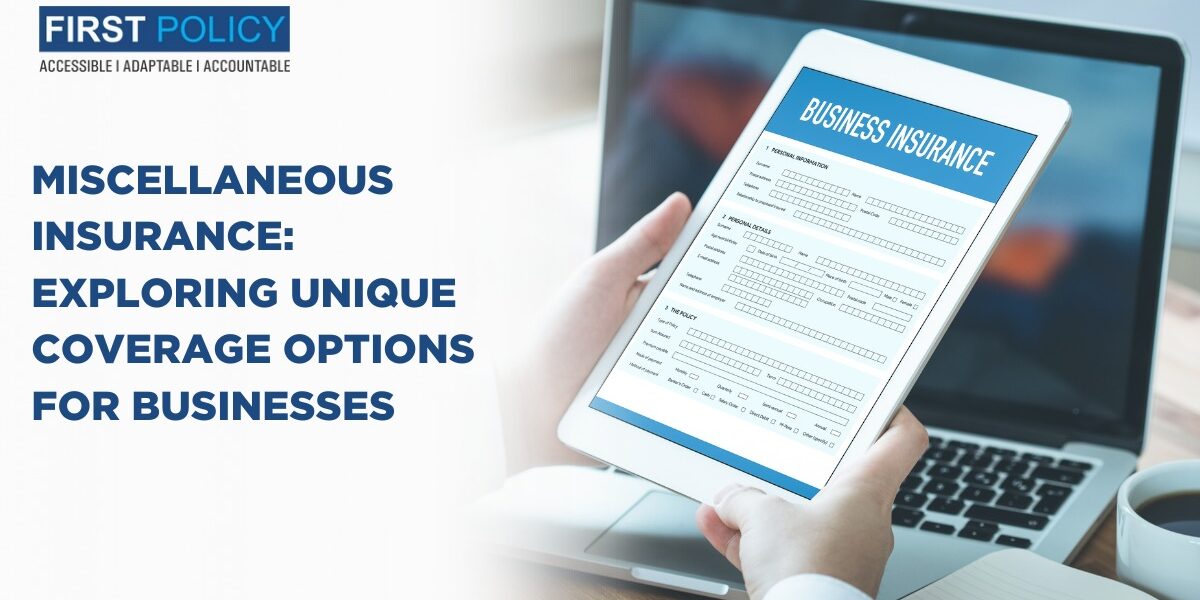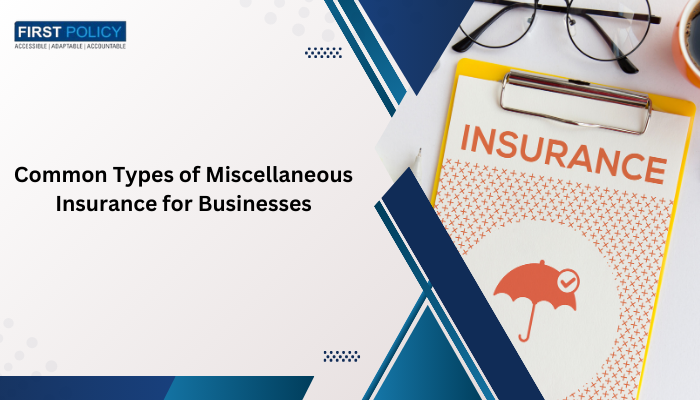
Miscellaneous Insurance: Exploring Unique Coverage Options for Businesses
The insurance policies of choice in the complex and ever evolving arena of business risk are standard insurance policies which include, fire insurance, commercial general insurance and such like liability coverages. Despite this, not all risks easily fit into these traditional categories. More often than not, businesses carry particular and diverse exposures that require more specialized solutions. This is the space where miscellaneous insurance plays, custom built coverage options meant to fill the gaps when one does not think it exists.
Here in this blog we will understand different miscellaneous insurance products including fidelity guarantee insurance and commercial general insurance which will protect businesses specially against certain challenges. A familiarity with these options will enable managers and business people to effectively safeguard their businesses, employees, and assets from damage.
What is that Miscellaneous Insurance all about?
Miscellaneous insurance, as the name indicates, is a kind of policy that is not in the standard insurance lines of property or health, but are of risks which may not be a liability. Then, these policies offer protection in specific cases when similar scenarios might exist in specific industries and business models. Miscellaneous insurance is very adaptable and it is possible to tailor it to the needs of the business, to cure the gaps left in general policies like fire insurance or commercial insurance.
Common Types of Miscellaneous Insurance for Businesses

- Employee dishonesty is one of the most critical but least considered risks for businesses. Fidelity guarantee insurance applies in the event of financial losses caused by fraudulent employee acts. For example, embezzlement, forgery, and other fraudulent or theft type offenses.
Fidelity guarantee insurance provides peace of mind to companies that process large amounts of money, valuable inventory or sensitive data, and that don’t want an employee’s bad behavior to become a serious financial threat. The policy generally reimburses a business for financial loss suffered to the business as a result of employee misconduct and is specific in relation to defined roles or departments within a business that are more prone to this type of risk.
- Miscellaneous insurance policies offer insurance to your business that cater to particular risks, however initial insurance basics with commercial general insurance is vitally important for any enterprise. Commercial general insurance (CGI) covers common business liabilities, including bodily injury, property damage and personal and advertising injury claims.
CGI is all encompassing policy which protects business from claims arising from normal operations. Commercial General Insurance is there whether suing foreign currency interbank transactions for defamation, or a slip and fall accident on your company’s premises – it will act as a cushion against unexpected legal proceedings taking a toll on your business’s finances. Other forms of miscellaneous insurance can also complement this policy to cover all of the common and niche risks.
- Fire Insurance Another business that should consider putting fire insurance in place is when the business is exposed to damages caused by fire. Given how devastating those can be to a business, it can also impact loss of property, loss of inventory, and loss of crucial documents.
Fire insurance policies are designed to provide compensation for repairs to or replacement of the physical structure to which the goods are attached and to cover the contents themselves. If your business has a warehouse or factory, a sound fire insurance policy is a must to protect the business from disaster in the event of a fire. In addition, as well as providing protection against unexpected events, fire insurance is often customizable, often adding risk of explosion or natural disasters, and is an important and flexible part of a business’s risk management strategy.
- Another threat that businesses need to cover is burglary or theft. Business burglary insurance is designed to protect your business from losses due to forced entry and theft. It’s this type of policy that covers the stolen property, property that is damaged during the break in and, in some cases, loss of income (due to a business interruption) caused because of a burglary.
Burglary insurance can be valuable to retailers, warehouses and even offices with higher crime rates in areas it resides. The type of insurance that ensures businesses recover financially in the event of such events and carry on with their business without major disruption [irregular disruption].
- However, the risks to Construction businesses, especially Contractors All Risk Insurance, don’t always fit into the standard types of insurance. Contractors All Risk (CAR) is a specific policy designed to insure the construction projects of contractors against a wide range of risks arising in building and engineering works.
There is coverage for damages to the project itself, third party claims for injury or property damage, and for machinery and equipment used on site. Miscellaneous insurance of this type provides the protection from the first to the last step of a project thus shielding construction firms from expensive risks.
- Marine Insurance Import and export of goods is an important activity for any business and this requires marine insurance. This policy includes loss or damage of cargo being carried by sea, air, or land. Businesses that rely on logistics or shipping require marine insurance that protects the value of goods from events they could be unforeseen such as storms, piracy, accidents.
- This may not look like a miscellaneous insurance policy at first blush, but employee benefits solutions are part of business risk management. In most cases, this type of insurance package generally provides health, life, and disability for employees that help businesses attract and retain talent on the one side and helps a financially secured workforce on the other side.
The Importance of Tailoring Your Miscellaneous Insurance
Since no two businesses are exactly alike, miscellaneous insurance options have to be tailored for a unique need. Likewise, a retail business might need fidelity guarantee insurance because they can deal with employee theft, another manufacturing firm that needs fire and burglary insurance to protect their assets and facilities. So too a tech company may be entirely dependent on commercial general insurance to cover liabilities stemming from data breaches or software failure.
To get the most out of your policy you should customize your insurance to match your industry, company size, and business risk. Insuring with the right miscellaneous products to fill the gaps in your existing policies can be highly beneficial, and working closely with insurance advisors or brokers can help you find those specials.
Conclusion: Protecting Your Business with Miscellaneous Insurance
Besides fire insurance, commercial general insurance, and liability coverages, which make up the basic component of most business insurance products, other miscellaneous insurance policies have more real power of protection if they can be used properly. Fidelity guarantee insurance and contractors all risk insurance are specialized policies that a business uses to deal with specific risks.
With companies growing and changing, risks change too. To effectively control these risks, it is important to be proactive in the continuous improvement and expansion of the product in order to manage its effects using miscellaneous insurance products customized according to the client’s business specific needs. Investing in the correct mix of general and niche policies will safeguard a business amidst both common and unpredictable threats, giving business owners comfort in an ever changing world.
Finally, no business should not only purchase fire, commercial general, and fidelity guarantee insurance alone but also some other miscellaneous insurance that will best match the specific operational risk of the business. With this strategy in place, businesses have a complete, adaptable risk management plan that can guard against the usual liabilities and those that lie well outside the radar.





